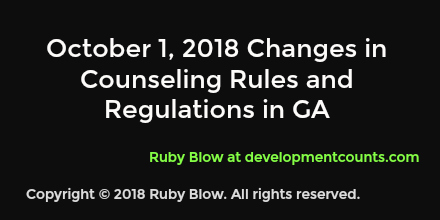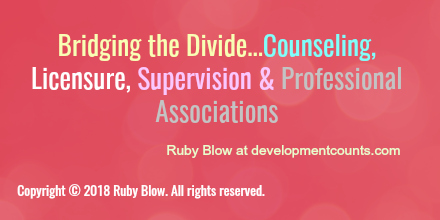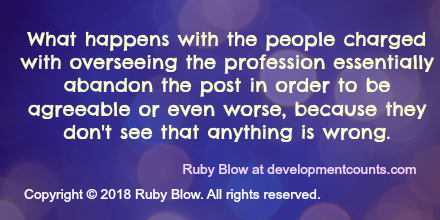The Right to Diagnose
Many of my peers and colleagues were surprised to know that Licensed Professional Counselors in Georgia did not have a legal right to diagnose those with mental health disorders in the state of Georgia prior to last year’s battle by the Licensed Professional Counselor’s Association (LPCA-GA) to pass a bill into law allowing Counselors to do just that – diagnose.
In fact, prior to Senate Bill 319 (signed on 4/26/16 by the Governor) licensed counselors were only allowed to give “diagnostic impressions,” a term we coined to described our practice of diagnostic/psycho-social assessment and conceptualization of the presenting issues as it related to DSM (the Diagnostic and Statistical Manual of Mental Disorders) criteria. This limitation had very little impact on our ability to practice independently, however that time was quickly coming to a close.
Many do not know how serious the consequences of this bill passing or not passing had for APC’s and LPC’s in the State of Georgia. If it did not pass, it may have very well led to the loss of the largest licensed mental health work force in our state (LPC’s) due to no longer being able to seek reimbursement for services. (This is related to provisions in the Affordable Care Act.) From the outset of our profession, it has been that as individual providers, counselors were ineligible to be providers for medicaid or medicare.
The fact that we could not diagnose independently has always been a major factor in that reality. Counselors were also experiencing other limitations of practice. It was about 4 or 5 years ago that I began to really notice the foreseeable impact of not being able to legally diagnose.
Serving Military, Veterans and their Dependents
At that time, many counselors in private practice were seeking to be included or maintained on the TRICARE insurance panel (formerly known as CHAMPUS- Civilian Health and Medical Program of the Uniformed Services). TRICARE is a Health Benefit program that serves Military and their families. The following must be enrolled in the Defense Enrollment Eligibility Reporting System to apply for TRICARE coverage:
- Active Duty Military
- Retired Military
- Disabled Veterans
- Dependents
- and Department of Defense Active Contractors
In order to seek reimbursement at a higher rate, as well as to be able to practice relatively independently, Professional Counselors on the panel were required to get their diagnosis confirmed by a Doctor. Next there was a strategy to increase the real or perceived competency of the Professional Counselor providers by allowing a path to independent practice within the TRICARE system.
That path involved taking and passing the National Clinical Mental Health Counseling Exam. And additionally completing a detailed application process. In order to sit to take the NCMHCE, counselors needed to demonstrate 60 credit hours in their degree program among other requirements.
For a limited time there were some alternate entry options for those seeking independent practice on TRICARE who had 45 or 48 credit hours in their degree programs. These are just some of the details that determined eligibility.
At the same time, The Affordable Care Act – also known by many as Obamacare – called for streamlining and decreasing costs of healthcare. This followed an increasing trend in the demand for allied health professionals to provide mental health services that were being reimbursed by 3rd party payers like insurance companies at lower rates than those reimbursement rates of Psychologists (for example).
The Veteran’s Administration began to develop a process for Counselors to have job descriptions and hiring committees within the VA; however passage of the NCMHCE was a part of the criteria.
Increasing Licensing Standards
A few years ago, our state licensing board (the GA Composite Board for LPC’s, SW’s and MFT’s) created a rule (which was subsequently removed) that applicants pursuing the LPC would have to take the NCMHCE to obtain their independent license. And to become an Associate Professional Counselor, the NCE (National Counseling Exam) would be required. So that would have meant two exams for Counseling licensure in Georgia. As I stated, that new rule was rolled back.
However, it was part of important trend which includes an attempt to secure better reciprocity across states with other licensing boards by making our requirements more stringent and improving the clinical skill sets of counselors in GA.
In fact, other parts of those rule updates remain and go into effect after September 30, 2018.
- An increase to 35 hours of supervision each year (from 30 per year);
- 9 out of 9 course content areas and CACREP– Council for the Accreditation of Counseling and Related Educational Programs) standards or the equivalent;
- a 600 hour practicum or internship instead of 300 hours;
- 1000 hours of directed experience per year; and
- and at least half of supervision must be provided by a certified supervisor (CPCS – Certified Professional Counselor Supervisor or ACS– Approved Clinical Supervisor).
A Brief Summary of Counseling in Comparison to Other Professions
All signs were heading toward an increased demand in the “clinicalization” of Professional Counseling. More degree programs began to shift their identities from community counseling to clinical mental health counseling.
Counseling as a profession is newer than Social Work, Psychology, and Marriage & Family Therapy. Our professional associations and our educational programs have not been around as long as our colleagues.
The counseling professions’ identity was founded on humanistic approaches that did not lean heavily on diagnosis or psychopathology but instead incorporated a focus on developmental factors, prevention, and counseling for all. Counseling for the wounded well; counseling in schools; counseling in rehabilitation facilities; counseling in the workplace and counseling in private practice.
As the counseling profession in GA and other states has increased in numbers, we began to fill much of the demand for mental health treatment. Our graduate programs include traditional post-graduate work in university settings with limited numbers of enrollees, private professional schools, and non-traditional schools that have allowed for a rapid increase of counselors in the work force.
Those eligible to become counselors in the state of Georgia have come from a variety of education backgrounds. In that way our, licensing rules differed from some of our allied professionals.
Licensed Professional Counselors have Masters, Specialists, and/or Doctoral degrees in any of – but not limited to – the following:
- Professional Counseling
- Community Counseling
- Clinical Mental Health Counseling
- Psychology (applied)
- School Psychology
- Industrial Organizational Psychology
- School Counseling
- Rehabilitative Counseling
- Counselor Education and Supervision
- Recreational Therapy, and so on.
Counselors work in a variety of settings doing work that, in many cases, is clinical in nature with regard to mental health being a primary focus and possible diagnostic criteria being met by those receiving the services. In other cases, counselors are providing guidance counseling and supporting those who are struggling with esteem, relationship and family barriers and so on.
Practice Within Your Scope – An Ethical Responsibility
We have an ethical mandate to only practice in our areas of competency. However, the right to practice independently is granted by licensure. Once a person becomes independently licensed, they have an opportunity to practice independently and to pursue areas of practice that may or may not be in alignment with what their education, training, consultation and supervision have prepared them to engage in on their own.
We need clear guidelines and restrictions of practice to protect the public. The only assurance the public has of competency (outside of their experience with a provider) is that that person is licensed by the state.
With the passing of Senate Bill 319 which altered GA Law Code Section 43-10A-3 to include limitations of practice regarding the use of psychological testing instruments, and the inclusion of diagnosis in the Counselors scope of practice…a door was opened to examine the competency of Professional Counselors to diagnose.
This also engaged concerns from Psychologists about the potential for counselors to engage in psychological testing independent of Psychologists oversight based on “diagnosis” being added to our scope of practice. Additionally, a number of LPC’s received training in testing and report writing for Psychologists as they pursued directed experience work in the field toward licensure.
Other counselors have training in administering tests because of their background in School Psychology. While others had degree programs that incorporated extensive course work and even practicum and internship opportunities at sites that incorporated psychological testing.
As a result of these related matters, a provision setting limitations on testing was included in Senate Bill 319. The language that describes these limitations will likely be narrowed down and borne out in practice and legal cases. I am not tackling that matter in this blogpost, as I believe it to be something of vital importance…but not something that concerns me very much because I don’t know any LPC’s who attempt to engage in unauthorized or unsupervised testing.
The truth is…based on a Counselor’s experience, training, supervision and background…they may or may not have had much opportunity to expand their clinical skill set because not all counselors work in settings that are primarily focused on the treatment of mental disorders.
Educational Requirements for LPC Licensure
In fact, the academic criteria for independent licensure for Counselors did not include (until the passage of Senate Bill 319) a requirement for a course in diagnosis/psychopathology/abnormal psychology. Until then the only truly required course was Counseling Theory, which was closely followed by a practicum/internship. (Which, if missed, could be made up by adding an additional year of work in the field of practice post-graduate school. This was in addition to the 1, 2, or 3 years requirement, based on whether the applicant received a doctorate, specialist or masters as their terminal counseling related degree).
Counselors have been required to have 6 out of the following 9 content areas to pursue licensure in GA (October 1, 2018 they will be required to have 9 out of 9):
- Human Growth and Development
- Group Counseling
- Career Counseling
- Individual Assessment
- Research
- Ethics
- Multicultural
- Psychopathology/Diagnosis
- Counseling Skills
As a result of this law passing before the 9 out of 9 content areas are required for licensure, the law that went into effect on April 26, 2016 – giving Counselors the right to diagnosis – appears to have superceded the educational requirement rule change that does not go into effect until October 1, 2018.
This means that some people working toward counseling associate licensure or licensure have found themselves no longer eligible under the rules for which they first began to seek licensure. Senate Bill 319 addresses licensees (but not active pre-licensees’) predicament. It remains to be seen if those working toward licensure will be able to participate in Continuing Education to meet the education requirements or if they will have to invest their financial resources in taking a graduate course in Diagnosis/Psychopathology.
Who is Impacted by Senate Bill 319 and its Requirements?
Our Licensed Clinical Social Worker colleagues have had the right to diagnosis in GA. However, depending upon their specialty track in their graduate programs, they may not have had a course in diagnosis/psychopathology/abnormal psychology themselves.
So as a result of the passing of Senate Bill 319 and its provisions, the Georgia Composite Board for LPC’s, SW’s and MFT’s was required to come up with a curriculum for continuing education related to diagnosis by “persons licensed under this chapter,” which includes LPC’s, LCSW’s and MFT’s.
The deadline for the development of the curriculum passed on January 1, 2017. The law also requires that those who do not have the required coursework must finish the educational requirements by December 31, 2017.
Licensees who have had their independent licenses 10 years or more do not have to meet this new educational criteria. According to a notification from LPCA-GA (the Licensed Professional Counselors Association of GA- a state chapter of the American Mental Health Counselors Association) the 10 years is being measured backward from the date the law went into effect April 26, 2016…so you must have been licensed prior to April 26, 2006 in order to not need to explore whether or not you previously met the now mandated educational requirements.
Where do We Stand Now?
We should know very soon what the GA Composite Board will allow for licensees to meet this criteria. I am hopeful that someone will also raise the question for those who are pursuing independent licensure and may not have had a diagnosis graduate course.
This post is a reflection of my own understanding of a series of events impacting my profession in Georgia. It is up to each licensee to read, know, follow and attempt to comprehend the board rules on their own. I am hopeful that this will provide some context for the trends in the counseling profession that impact clinicians, their supervisors and employers…not to mention 3rd party payers here in Georgia.
If you are not receiving my weekly e-blast which includes my blog post as well as continuing education opportunities, please sign up on my homepage at developmentcounts.com.
Copyright © 2017 Ruby Blow. All rights reserved.
Share your thoughts on Linkedin, Facebook, Twitter or log in to one of your accounts below to comment. Subscribe to my YouTube channel.





